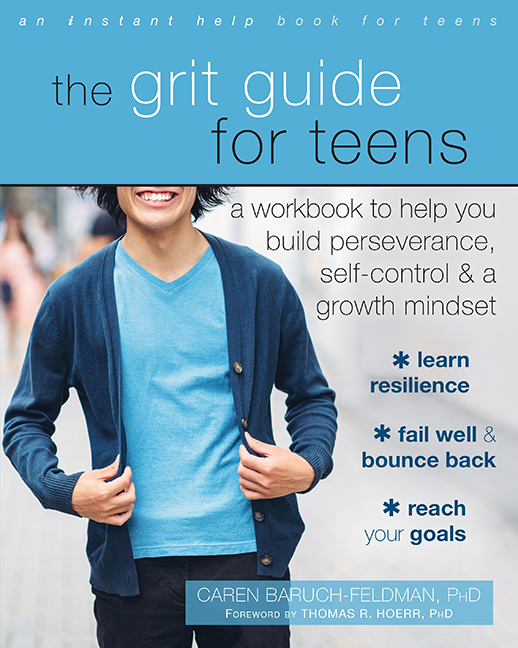by Caren Baruch-Feldman, PhD, author of The Grit Guide for Teens
To make sure that we’re all on the same page, here is a basic definition of grit, developed by Angela Duckworth, the psychologist and researcher who coined the term: Grit is passion and perseverance for long term and meaningful goals.
Grit is passion and perseverance for long-term and meaningful goals.
It is the ability to persist in something you feel passionate about and persevere when you face obstacles. This kind of passion is not about intense emotions or infatuation. It’s about having direction and commitment. When you have this kind of passion, you can stay committed to a task that may be difficult or boring.
Grit is also about perseverance. To persevere means to stick with it; to continue working hard even after experiencing difficulty or failure.
What can you do to help boost grit?
Download a free guide for parents and teachers!
Research indicates that the ability to be gritty—to stick with things that are important to you and bounce back from failure—is an essential component of success independent of and beyond what talent and intelligence contribute (Duckworth 2016).
Why is grit important?
I’m going to say it again because it’s worth repeating, and goes against what we’re taught in school and in our social circles. Grit is important because it is a driver of achievement and success, independent of and beyond what talent and intelligence contribute. Being naturally smart and talented are great, but to truly do well and thrive, we need the ability to persevere. Without grit, talent may be nothing more than unmet potential. It is only with effort that talent becomes a skill that leads to success (Duckworth 2016).
Without grit, talent may be nothing more than unmet potential.
So how can we (I include myself here as a therapist) help our clients become grittier? Not by demanding that they pull themselves up by their bootstraps or by setting unreasonable expectations and assuming teens can meet them all on their own. For teens to grow their grit, we need therapists like you to help them get there.
What can you do to help boost grit?
Download a free guide for parents and teachers!
 Caren Baruch-Feldman, PhD, is a clinical psychologist and a certified school psychologist. She has authored numerous articles and led workshops on topics such as cognitive behavioral therapy (CBT) techniques, helping children and adults cope with stress and worry, helping people change, and developing grit and self-control. She is the author of The Grit Guide for Teens.
Caren Baruch-Feldman, PhD, is a clinical psychologist and a certified school psychologist. She has authored numerous articles and led workshops on topics such as cognitive behavioral therapy (CBT) techniques, helping children and adults cope with stress and worry, helping people change, and developing grit and self-control. She is the author of The Grit Guide for Teens.
References
Duckworth, Grit: The Power of Passion and Perseverance (New York: Scribner, 2016).


 2024 Peace Playbook: 3 Tactics to Avoid Clashes with Your Partner
2024 Peace Playbook: 3 Tactics to Avoid Clashes with Your Partner